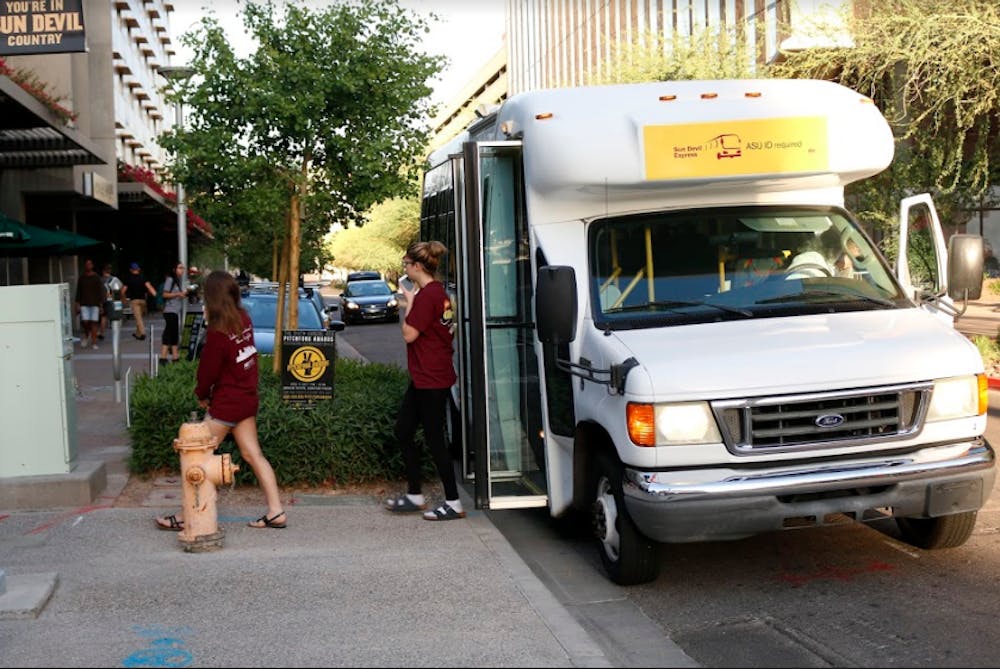The future of the Sun Devil Express is in flux after a divided Undergraduate Student Government Downtown Senate voted to table a bill that would have given control of the system to the incoming executive board.
The express is a bus route that takes Downtown students to several parking stations every evening, as well as to the grocery store on Mondays and Wednesdays.
The route has been a point of contention since its conception, with former several Senate members calling into question the performance of the program.
This semester the debate was rekindled, as the current Vice President of Policy Jimmy Arwood opposed the continuation of the service, despite near unanimous support from the Senate.
Read more: USGD funds downtown grocery shuttle, draws skeptics
“This service needs to end,” Arwood said after the meeting. “I would say we have done so much already that there is nothing else we can do.”
Arwood said that the main problem with the program was the sheer price but also cited low ridership numbers.
"I’ve said that since the beginning of the year," he said. "I think this year just goes to show how the dynamic has changed and there are problems that we just can’t fix."
The yearly budget for the Express is $36,000.
Neither the University, nor any USGD officials could provide information on where the funding was appropriated from. Arwood said that it either came from an outside grant or the student programming fee.
“I’ve heard that one, it comes from an outside source from some kind of grant money,” Arwood said. “The second place it could be coming from is the student programming fee, which is what funds student government.”
Later in the year, as problems continued other senators began to oppose the service as well.
One of the most vocal senators in opposition was Cronkite Senator Bryce Newberry, who said the system has never lived up to expectations.
“The low ridership numbers are the biggest problem,” Newberry said. “We have not seen high ridership the last three years and have not hit goals that we have set for the ridership to justify the cost.”
Another reported issue is that the bus drivers skip stops and go off of the planned route.
“Another issue this year especially has been the route, because the ridership is so low often the drivers will go directly to the stops to drop someone off, they won’t follow the route that they are supposed too,” Newberry said.
Newberry said that the program started off as mandate from the administration.
“When they started the Sun Devil Express, it was kind of an administrative-mandated program, because administrators were promoting that we had a shuttle for safety at orientation,” Newberry said.
Joining Newberry is Cronkite Senator Rilee Robinson, who said that marketing didn’t do much for the service.
“It is really hard to market a service that is failing,” Robinson said. “Especially when we have tried to fix it.”
Robinson said past marketing efforts didn’t work. She said that numbers improved for a bit, but not by much.
USGD President Jackson Dangremond, who was one of the people who would have been overseeing the future of the project had the bill passed, said that the real problems came from a lack of communication.
“I share similar concerns as the Senate, in the sense that throughout the year I’ve been concerned about the management of the Sun Devil Express,” Dangremond said. “If a concrete communication plan isn’t actually established between USGD and the vendors than the service just won’t be as successful as we want it to be.”
Throughout the issue, some alternatives have been discussed such as using ride-share services. Dangremond said that everything was on the table, as long as any replacement was viable.
“I definitely say that looking at alternatives is in the realm of possibilities, but our deciding factor will be more correlated to the products of the conversation whether positive or negative,” he said.
Dangremond said the core of the argument is whether the service was a matter of convenience, or a matter of safety.
“That is a conversation we have had,” he said “Equating the two is difficult because we’ve had a hard time deciding whether it is for safety or for convenience.”
Dangremond said that he believes the issue is one of his top priories and hopes to have it resolved early in the administration.
“We are committed to the future of whatever the service may be in regards to insuring the service is successful,” Dangremond said. “I am very confident this is an issue we will be able to tackle in the next administration, and I look forward to the work that will be done.”
Reach the reporter at isaac.windes@asu.edu or follow @isaacwindeschef on Twitter.
Like The State Press on Facebook and follow @statepress on Twitter.




